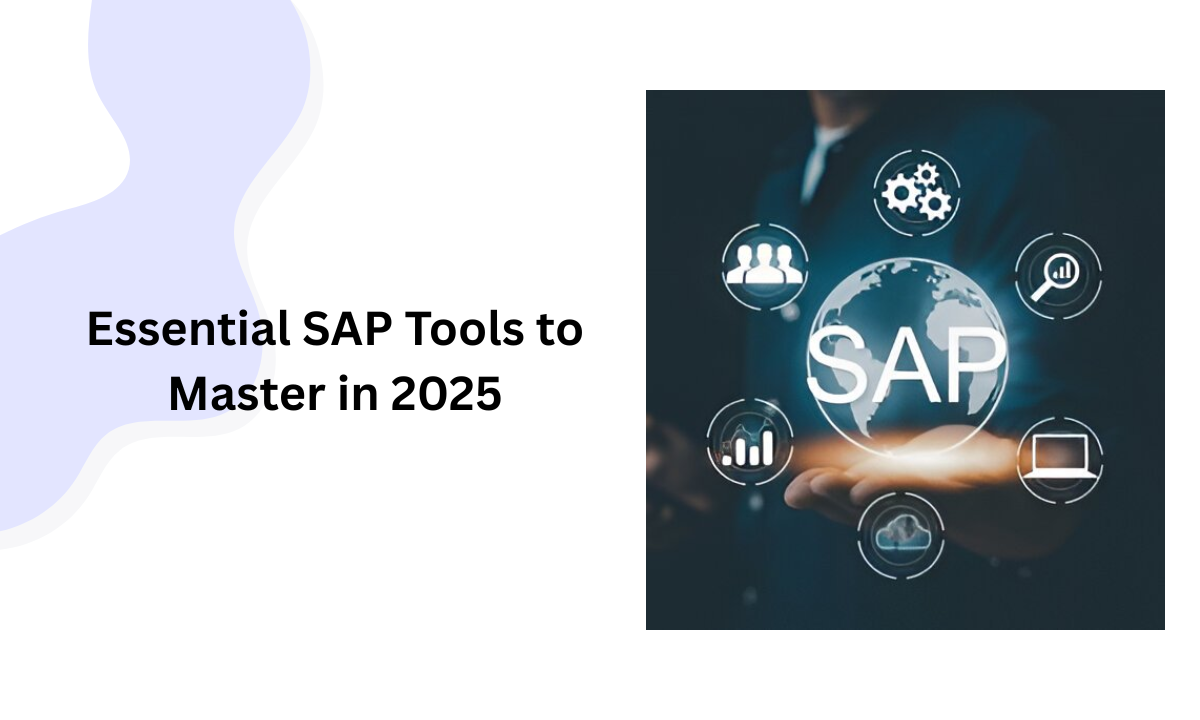Table of contents:
|
1. Enterprise Resource Planning (ERP) – The Core of SAP Tools |
|
2. Business Process Management (BPM) & Process-Automation Tools |
|
3. Business Intelligence & Analytics – Turning Data into Insight |
|
4. Customer-Relationship Management (CRM) – Connecting with the Market |
|
5. Supply-Chain Management (SCM) – The Backbone of Operations |
|
6. Human-Capital Management (HCM) – Powering the Workforce |
|
7. Why These SAP Tools Matter in 2025 |
|
8. How You Can Prepare with Apponix |
|
9. Conclusion |
|
10. FAQs |
As a trainer at Apponix in Bangalore, I’m excited to walk you through the must-know SAP tools that are shaping the enterprise software landscape today.
Whether you’re looking to master software for SAP, dive into enterprise resource planning, or boost your skills in business intelligence and analytics, we will cover all critical platforms and give you a clear path to the training options we offer, including an SAP course in Bangalore.
1. Enterprise Resource Planning (ERP) – The Core of SAP Tools

One of the primary tools in SAP’s ecosystem is the ERP system. For example, SAP S/4HANA serves as the digital core that integrates functions across finance, procurement, manufacturing, and more. It embodies the “enterprise resource planning” lifeline of many global firms.
What makes S/4HANA especially powerful in 2025 is its in-memory architecture, real-time processing and full support of business process redesign.
With companies accelerating their migration, understanding this tool is essential for anyone aspiring to a career in SAP.
2. Business Process Management (BPM) & Process-Automation Tools
Beyond ERP, managing business processes end-to-end has become mission-critical. SAP’s process-management tools empower organizations to model, monitor and optimise workflows throughout departments.
Tools like SAP Signavio Process Manager and SAP Signavio Process Intelligence let users convert text-based descriptions to process flows and derive insights via analytics.
As a trainer, I emphasise that mastering these tools gives you an edge in understanding not just what the system does, but how business tasks flow through it. That’s a major differentiator for SAP professionals today.
3. Business Intelligence & Analytics – Turning Data into Insight
Data is king, and when it comes to business intelligence and analytics, SAP provides deep-dive tools to bring that data to life. For example, SAP Analytics Cloud continues to evolve with strong capabilities for dashboards, predictive insights and embedded analytics.
Meanwhile, SAP’s AI and machine-learning integrations further boost analytics across supply-chain, HR and finance functions.
If you want to work in roles that demand insight-driven decision-making, brushing up on these BI tools is non-negotiable. We cover these intensively in our SAP course modules at Apponix.
4. Customer-Relationship Management (CRM) – Connecting with the Market
One of the essential applications of SAP tools is in customer-relationship management: ensuring sales, marketing and service divisions operate in sync with backend and process systems.
Through integrated modules such as SAP Sales Cloud and SAP Service Cloud, organisations now manage customer data, streamline service requests and align their front-office operations with core SAP platforms.
If you’re training for roles in CRM or business development, understanding how SAP tools enable customer-centric processes will give you a strong advantage.
5. Supply-Chain Management (SCM) – The Backbone of Operations
Globally, supply-chain resilience is more critical than ever. The “tools in SAP” for supply-chain management — such as SAP SCM and integration with ERP via in-memory databases — support planning, procurement, manufacturing, logistics and fulfilment. The integration of AI has further improved predictive demand planning and real-time visibility.
In our training at Apponix, we emphasise how understanding SCM via SAP tools opens doors to roles beyond pure tech — you become a strategic operations partner.
6. Human-Capital Management (HCM) – Powering the Workforce
Human capital is as important as machines and data. Tools such as SAP SuccessFactors enable organisations to manage recruiting, onboarding, performance management, learning and development all within the SAP ecosystem.
These SAP tools for HCM are increasingly integrated with analytics and process-automation capabilities.
If you have an interest in HR-tech, talent-management or organisational development positions, proficiency in HCM-related SAP tools is a big plus.
Why These SAP Tools Matter in 2025
In today’s dynamic business environment, companies rely on integrated, intelligent systems.
The trend toward cloud, AI-embedded workflows and modular architecture means that SAP tools are advancing quickly — and there’s huge demand for professionals who understand them.
Businesses expect fewer silos, faster insights and seamless processes — and SAP’s suite of tools delivers that.
At Apponix Training Institute in Bangalore, our SAP course in Bangalore is designed to address exactly this reality: we train you not only on how SAP tools work but also why they’re used, how they support business goals, and what your role can be when you step into a career using them.
How You Can Prepare with Apponix
As a trainer, I recommend the following steps if you’re ready to dive into SAP tools:
-
Enrol in a comprehensive training programme that covers ERP, BPM, BI & Analytics, CRM, SCM and HCM.
-
Choose a training institute in Bangalore that offers hands-on labs, real-world case studies, and exposure to current SAP tool versions.
-
Focus on understanding business-process context, not just the software clicks, e.g., why a procurement workflow uses SCM tools, or how HR uses HCM modules.
-
Build small projects or simulations using SAP tools (for example, modelling a sales-to-cash process, or analysing workforce data in HCM’s analytics).
-
Stay current: SAP continuously releases updates, modules, and AI-based enhancements. A training institute in Bangalore with an active curriculum helps you stay ahead.
Conclusion
In my role at Apponix, Training Institute in Bangalore, I see day by day how knowing the right SAP tools transforms careers. Whether you’re aiming to work across enterprise resource planning, business process management, business intelligence and analytics, customer relationship management, supply chain management or human capital management, mastering SAP tools gives you a foundational skill set that employers value highly.
By training with us through our SAP course in Bangalore, you’re setting yourself up not just for one role but for multiple career pathways. You’ll gain technical knowledge, business-process insight, and the ability to connect software to real-world outcomes. That combination opens doors, from specialist roles to leadership positions.
I encourage you: invest in yourself, get comfortable with the SAP tools landscape, and let us at Apponix guide you through the transformation. The future of enterprise software is now, and you can be a key part of it.
FAQs
Q1: What exactly are “tools in SAP”?
In essence, tools in SAP refer to the suite of software modules and platforms that help organisations manage enterprise-wide processes, from ERP systems and BI analytics to SCM, CRM and HCM applications.
Q2: Is training in SAP tools only for tech professionals?
No. While some modules require technical acumen, many roles focus on process understanding, analytics, and management. For example, someone in HR might specialise in SAP HCM tools without deep coding skills.
Q3: Why is an SAP course in Bangalore useful?
Bangalore offers access to a strong ecosystem of training, exposure to multinational companies, real-world labs and networking opportunities. A training institute in Bangalore can give you both the practical skills and local industry context.
Q4: How quickly do SAP tools evolve, and should I worry about them becoming outdated?
SAP tools evolve rapidly, with cloud deployments, AI-embedding and modular architecture. But training that focuses on core concepts (not just a version) ensures you remain adaptable and ready for updates.
Q5: After mastering SAP tools, what career roles can I aim for?
You could aim for roles like SAP consultant, process analyst, system architect, business intelligence specialist, HR systems manager, or supply-chain systems expert. The training gives you flexibility across domains.




